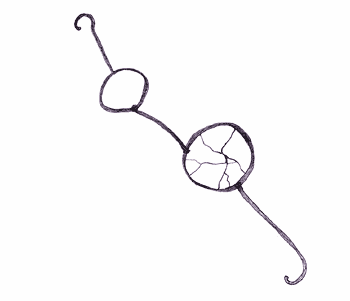"Well?" Dolores stands before him, hands on hips. "How old are you?"
It's a fight-or-flight scenario, and Tristan's impulse is to flee. He is a nuisance and a fool and it is time he got back home. But fight is stronger in Tristan, so instead he draws himself up and says, "Old enough."
Dolores giggles. "Old enough for what?"
Tristan is stumped. A Hebrew phrase his mother uses when she scolds the young ones jumps into his mind and then right out his mouth.
"Old enough to know better."

"Better than me?" Dolores asks, crossing her arms over her chest in a posture of aggression, or mock-aggression. Tristan is not sure which, and he doesn’t want to make any assumptions.
"Old enough to know when to give up," he smiles, raising his palms chest-high.
"You give up pretty easy," she says with a wicked smile. "So what are you, anyway?"
"Well, I want to be a writer." Saying it is easier this time, but no less exhilarating.
"No." Dolores leans forward at the waist without uncrossing her arms, as if he is dumb or hard of hearing. "I mean what are you."
"Oh." Isn't it obvious? "I'm Jewish."
She raises her hand to Tristan's face, so close that his cheek tingles in unfulfilled anticipation. "But you haven't got those curly things," Dolores says.
Tristan is charmed by her ignorance. This is the dream, he thinks, of every boxed-in kid in the neighborhood: to be around people who know nothing about us.
"That's only if you're very religious," he explains. "I'm barely religious at all." The hall is empty save the two of them, and Tristan feels the space acutely after all the bodies he's brushed up against tonight. "I never go to synagogue," he continues in the silence -- in the noise, rather, which is loud and just around both corners, but in the silence of her voice. "I don't think I even believe in God. Not the Jewish God, anyway, the one who cares whether you eat meat and milk from the same dish." A nervous laugh snorts from him. "I mean, the milk touches the meat when they're both part of the cow, right? And who's fault is that?"
It's an old joke, but of course it is new to Dolores. She laughs and Tristan wonders what else he can reveal or retell to impress her. The joke about the Jewish man stuck on the desert island is a good one, but he doubts she'd understand the punchline about the guy building two shuls, one of which he prays in and the other of which he wouldn't be caught dead in. Besides, it feels wrong to tell such a joke to a gentile. He imagines her repeating it to her friends at school on Monday, thinks about how the joke would change shape in her possession, and puts it from his mind.
"So this is your job?" he asks her.
"Only once a month, The rest of the time, I just live here."
"I see. So Charles is your..." he waits for Dolores to fill in the blank with brother, uncle, cousin. Charles is too young, too agile and unbeaten and of-the-New-World, to fit with Tristan’s conception of father.
Nonetheless: "My father." Dolores narrows her eyes. “You know him?"
"We just met. I helped him set the drums up."
"Oh. Can I ask you a question? Is it true that Jewish people have to do it through a bedsheet with a hole cut out?"
It is all Tristan can do not to be taken aback by her frankness. Not that he minds: if anything, what offends him is his own culture of prudishness -- the fact that with the exception of Leah Krasner, who lets boys touch her for money, no girl he knows would ever say anything so bawdy in mixed company. Nor, for that matter, have Tristan's parents ever summoned the courage to explain to him even the basic concept of reproduction. Everything Tristan knows of sex he's learned on the streets. Everything Benjamin knows he's learned on his bunkbed, listening to his big brother whisper up at him from underneath.
Tristan fires off a quick volley of cover-up laughter, and when it burns itself out he says, "Where in the world did you hear that?"
"It's not true, then?" He can't tell whether Dolores is relieved or disappointed. What else does she think about him, about his people? Then again, until a minute ago the only folk Dolores recognized as Jewish were the Hasidim. This in itself throws Tristan for a loop; he's never thought of himself as able to pass for other than he is. A little imagination a few moments back, and he could be a goy right now, footloose and fancy-free. Not that he'd want to, really.
"Maybe if you're extremely, extremely religious,” Tristan says. “And by extremely religious, I mean crazy." She gives him a strange, sad smile, and he can tell that Dolores, ignorant of the complexities of Judaism-as-religion versus Judaism-as-heritage, is wondering why he seems so scornful of his own people.
"You're very curious," he tells her, wanting to erase the look of pity from her face.
"If I want to know something, I ask. What about you? Isn't there anything you want to know about black people?"
The truth is, there is plenty, but nothing Tristan can put into words. He won't ask after stray rumors and stereotypes the way Dolores does; he's never believed them anyway. How do you ask what's your life like? The only answer Tristan can imagine is A lot like yours. How do you ask What is it about black people that I find so interesting, even though I don't know any?, or How does it feel to be so majestic and yet so debased? You don't. You can't.
Instead, Tristan opens his mouth and is surprised to hear himself say, "Can I see your room?"
It is not what Dolores expects, either. She gives him another of her odd, bemused looks, then says, "Sure," and leads him down the hall. They stop before a narrow, dark staircase. "It's up here."
"You have two floors?" Another idiotic question from the young ambassador, but such luxury is so foreign to Tristan that he cannot stop himself.
Dolores says nothing. The steps creak with each footfall, and Tristan is compelled to silence. There is a sweet sneakiness to this mission, this escape into private, and Tristan emboldens himself by remembering that he initiated it.
The upstairs is smaller, all bedrooms. Dolores leads him through the hall until they reach the end, and the only closed door. The floor buzzes with the noise of the party downstairs, but the click of the doorknob turning in Dolores' palm echoes through the corridor. Tristan stands behind her, trying to smell her hair, but it is saturated with the smoke of the gambling room and so he can only imagine the perfumed haze he's sure encircled her before the guests arrived.
Tristan does not have to imagine for long, because as they enter the tiny room he is met with a blast of just the kind of womanly scent he's been trying to conjure. A little tray-table full of cosmetics sits in one corner of the room with a plastic-framed vanity mirror atop it, tilted against the wall. It is so low that Dolores must have to kneel before it, and the thought of such a compromised glamour makes Tristan sad for her. The rest of the room, too, is almost miniature. The mattress is narrower even that his bunkbed; it lies on the floor below a down-sloping ceiling, against the room's only window, which is covered with pink plastic blinds. The closet is stuffed with clothes and stacks of books, the open door jutting out almost halfway to the opposite wall.
It may be a glorified linen closet, but it is her own room, and Tristan is jealous. He puts his hands in his pockets and turns in a slow, appreciative circle, as if in a museum. "My sister Lillian got married last year," Dolores says, "and I got her room. Before that, I shared with my little sister Ida down the hall."
"How many kids in your family?" He notices some pictures taped up by the bedside, clipped from newspapers and magazines. They are all of black women. The only one he can identify is Josephine Baker.
"Six. Seven, but my brother Michael died when he was a baby. You can sit down if you want." Dolores is perched on the edge of the low mattress, with her legs crossed and her hands in her lap. She pats the space beside her and Tristan folds himself into it. He feels like a giant in this room; standing, his head is only a few inches from the ceiling. Even when he sits, the plaster angles down to menace him.
"Thanks." He crosses his legs too. It is the only option the space offers.
"You know," Dolores says, "I'm older than I look. I'll be eighteen November first. I'll bet you thought I was younger."
"I hadn't really given it much thought."
She turns to him and grabs his hand. "My cousin Freda in Chicago is twenty-one. She has her own apartment and everything, and she said as soon as I finish school I can come out there and stay with her. She's got a job as a cigarette girl in a nightclub, and she's going to get me one too, and introduce me to all the stars she knows."
"That's great," says Tristan, with as much gusto as he can muster. It is nice to be touched by a girl, even incidentally, and Tristan would just as soon keep Dolores's mind on the glitzy Midwestern future and her hand on his. "What stars does your cousin know?" he asks.
"Well, Freda says that every weekend--" Dolores is saying when the doorknob turns. Her voice cuts out abruptly, like a radio when the power fails, and her hand snaps back into her lap. Both of them stare at the rotating lump of brass. Somehow Tristan knows, even before the door flies open and slams against the bedroom wall, that Dolores' father is behind it, and that this is very bad.
"Girl!" Charles fills the doorway, face hewn into a grimace. Tristan and Dolores leap off the bed and stand as far apart as possible.
"Daddy, I--" she starts, but already Charles is stalking across the tiny distance between the door and the bed, eyes fixed on Tristan. Dolores shuts her mouth and clamps her hands over it.
"You think you slick, huh boy?" Charles growls. His hands clench and flex by his sides. "Think I didn't know your game the second I laid eyes on you?"
 He seizes Tristan by the shirt and pins him hard against the sloping wall. The back of Tristan's skull slams into the plaster, and exploding lights spangle his vision. He blinks himself toward clarity, each blink a stroke against a current that wants to pull him out to sea. As he comes within reach of the shore, Dolores's screams sound in his ears like seagulls' caws: she is grabbing at her father's rigid arm, his hand now clamped around the base of Tristan's throat in a near-chokehold. The mere anticipation of being strangled robs Tristan of breath. Charles begins to shake him, back and forth. Again and again, Tristan's head hammers the plaster. Flakes fall from the wall like snow, and dust the ground.
He seizes Tristan by the shirt and pins him hard against the sloping wall. The back of Tristan's skull slams into the plaster, and exploding lights spangle his vision. He blinks himself toward clarity, each blink a stroke against a current that wants to pull him out to sea. As he comes within reach of the shore, Dolores's screams sound in his ears like seagulls' caws: she is grabbing at her father's rigid arm, his hand now clamped around the base of Tristan's throat in a near-chokehold. The mere anticipation of being strangled robs Tristan of breath. Charles begins to shake him, back and forth. Again and again, Tristan's head hammers the plaster. Flakes fall from the wall like snow, and dust the ground.
Dolores is still hanging on, and finally her father takes the time to push her away with his free hand. She exits Tristan's embattled field of vision, and he hears a sound that must be Dolores hitting the closet door.
Two flecks of lurid gin-spittle fly from Charles mouth and land on Tristan's cheek, and this, most of all, he cannot bear. To be beaten by a man is one thing, but to have his juices on your skin is another. Tristan stares back at his aggressor bug-eyed, seized by the inane thought that he would willingly endure all this if only Charles would loose him long enough to wipe off the saliva. The recognition that the violence has dislocated something he needs to think is scary, and the other fragments colliding inside Tristan’s brain are no more reassuring: the wondering, at once detached and panicked, whether Charles is mad enough to kill him as he no doubt could, snap Tristan's skinny neck like one of those dangling shtetl-butchered chickens. The looped internal protest of his innocence, I did nothing! I did nothing! and the deeper, contrary rumble of understanding for Charles -- sympathy even, because in some strange crevice of his soul Tristan knows he is guilty of every trespass Charles can conceive, and more.



A Parable after my hard drive crashed
Zalman Schachter-Shalomi
Christmas in Jerusalem
Jay Michaelson
Carobs
Elisha Porat
Dear Mr. Pinter
Dan Friedman
The Nuclear Physicist Gives his Son a Haircut
Hanan Harchol
Brodsky Begins, Part Two
Adam Mansbach
Archive
Our 870 Back Pages
Zeek in Print
Subscribe now!

About Zeek
Mailing List
Contact Us
Subscribe
Tech Support
Links

From previous issues:
Sephardic Culture: The Real Hidden Legacy >
Patrolling the Boundaries of Truth
What, me Tremble?
David Shasha and Jordan Elgrably
Joel Stanley
Jonathan Vatner